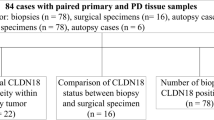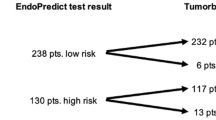Abstract
This study aimed to determine whether the expression of various tumor biomarkers of the mTOR pathway predicts tumor response to everolimus in metastatic recurrent endometrial cancer. Tumor blocks from 44 patients of a phase II clinical trial receiving everolimus until progression or toxicity were collected and evaluated at 3 and 6 months for response. Thirty-six blocks were available for analysis of ER, PR, HER2, LKB1, PI3K, PTEN, pAKT, 4E-BP1, p4E-BP1, and S6RP expression by immunohistochemistry, PTEN deletion by FISH, and mutational status of K-RAS, PIK3CA, PTEN, and AKT1 genes. Twelve of 34 evaluable patients had partial response or stable disease (PR, SD) and 22 had progressive disease (PD). Immunohistochemistry showed that no protein expression could predict response to everolimus. Neither could loss of PTEN expression or PTEN deletion or PTEN mutation predict patient outcome. Thirty-one samples were assessable for K-RAS mutations (ten for PR+SD and 21 for PD). There are only four patients with K-RAS mutations and none of them responded to treatment. Median progression-free survival (PFS) and overall survival (OS) were longer in patients without K-RAS mutations (PFS 3.12 ± 1.7 months versus 1.05 ± 0.4 months, p < 0.001; OS 9.28 ± 2.0 months versus 2.30 ± 1.4 months, p = 0.034). In conclusion, the level of expression of proteins of the PI3K/mTOR pathway tested in this study cannot predict response to everolimus. However, endometrial cancer patients with K-RAS mutations do not seem to derive benefit from everolimus treatment.


Similar content being viewed by others
References
Jemal A, Siegel R, Xu J, Ward E (2010) Cancer statistics, 2010. CA Cancer J Clin 60:277–300
Dizon DS (2010) Treatment options for advanced endometrial carcinoma. Gynecol Oncol 117:373–381
Karakas B, Bachman KE, Park BH (2006) Mutation of the PIK3CA oncogene in human cancers. Br J Cancer 94:455–459
Myers MP, Stolarov JP, Eng C, Li J, Wang SI, Wigler MH et al (1997) P-TEN, the tumor suppressor from human chromosome 10q23, is a dual-specificity phosphatase. Proc Natl Acad Sci U S A 94:9052–9057
Bae-Jump VL, Zhou C, Boggess JF, Whang YE, Barroilhet L, Gehrig PA (2010) Rapamycin inhibits cell proliferation in type i and type ii endometrial carcinomas: a search for biomarkers of sensitivity to treatment. Gynecol Oncol 119:579–585
Ray-Coquard I, Plantade A, Petit T, Lebrun-Jezekova D, Lavau-Denes S, Cretin J et al (2010) The ENDORAD trial: RAD001 (everolimus) monotherapy as second line or third line treatment of advanced endometrial carcinoma: a phase II trial of GINECO group. Ann Oncol 21 (suppl18). (abstract)
Meyer LA, Slomovitz BM, Djordjevic B, Galbincea JM, Johnston TA, Munsell M et al (2011) The search continues: looking for predictive biomarkers for response mTOR inhibition in endometrial cancer. J Clin Oncol 29. (abstract)
Kaplan EL, Meier P (1958) Non parametric estimation from incomplete observations. J Am Stat Assoc 53:437–481
Di NF, Arena S, Tabernero J, Grosso S, Molinari F, Macarulla T et al (2010) Deregulation of the PI3K and KRAS signaling pathways in human cancer cells determines their response to everolimus. J Clin Invest 120:2858–2866
Bansal N, Yendluri V, Wenham RM (2009) The molecular biology of endometrial cancers and the implications for pathogenesis, classification, and targeted therapies. Cancer Control 16:8–13
Mutter GL, Lin MC, Fitzgerald JT, Kum JB, Baak JP, Lees JA et al (2000) Altered PTEN expression as a diagnostic marker for the earliest endometrial precancers. J Natl Cancer Inst 92:924–930
Colombo N, Mcmeekin S, Schwartz P, Kostka J, Sessa C, Gehrin P et al (2007) A phase II trial of the mTOR inhibitor AP23573 as a single agent in advanced endometrial cancer. J Clin Oncol 25. (abstract)
Mackay H, Welch S, Tsao MS, Biagi JJ, Elit L, Ghatage P et al (2011) Phase II study of oral ridaforolimus in patients with metastatic and/or locally advanced recurrent endometrial cancer: NCIC CTG IND 192. J Clin Oncol 29. (abstract)
Oza AM, Elit L, Tsao MS, Kamel-Reid S, Biagi J, Provencher DM et al (2011) Phase II study of temsirolimus in women with recurrent or metastatic endometrial cancer: a trial of the NCIC Clinical Trials group. J Clin Oncol 29:3278–3285
Slomovitz BM, Lu KH, Johnston T, Coleman RL, Munsell M, Broaddus RR et al (2010) A phase 2 study of the oral mammalian target of rapamycin inhibitor, everolimus, in patients with recurrent endometrial carcinoma. Cancer 116:5415–5419
Boulay A, Zumstein-Mecker S, Stephan C, Beuvink I, Zilbermann F, Haller R et al (2004) Antitumor efficacy of intermittent treatment schedules with the rapamycin derivative rad001 correlates with prolonged inactivation of ribosomal protein s6 kinase 1 in peripheral blood mononuclear cells. Cancer Res 64:252–261
Noh WC, Mondesire WH, Peng J, Jian W, Zhang H, Dong J et al (2004) Determinants of rapamycin sensitivity in breast cancer cells. Clin Cancer Res 10:1013–1023
Gehrig PA, Bae-Jump VL (2010) Promising novel therapies for the treatment of endometrial cancer. Gynecol Oncol 116:187–194
Neshat MS, Mellinghoff IK, Tran C, Stiles B, Thomas G, Petersen R et al (2001) Enhanced sensitivity of PTEN-deficient tumors to inhibition of FRAP/mTOR. Proc Natl Acad Sci U S A 98:10314–10319
Yang L, Clarke MJ, Carlson BL, Mladek AC, Schroeder MA, Decker P et al (2008) PTEN loss does not predict for response to rad001 (everolimus) in a glioblastoma orthotopic xenograft test panel. Clin Cancer Res 14:3993–4001
Mori N, Kyo S, Sakaguchi J, Mizumoto Y, Ohno S, Maida Y et al (2007) Concomitant activation of AKT with extracellular-regulated kinase 1/2 occurs independently of PTEN or PIK3CA mutations in endometrial cancer and may be associated with favorable prognosis. Cancer Sci 98:1881–1888
Lax SF, Kendall B, Tashiro H, Slebos RJ, Hedrick L (2000) The frequency of p53, K-RAS mutations, and microsatellite instability differs in uterine endometrioid and serous carcinoma: evidence of distinct molecular genetic pathways. Cancer 88:814–824
Xing D, Orsulic S (2005) Modeling resistance to pathway-targeted therapy in ovarian cancer. Cell Cycle 4:1004–1006
Acknowledgments
The authors wish to thank MC Chapeau, L Arnould, M Gelly-Marty, L Arnould, F Collin, S Mercier, S Alvernhe, Helie, S Isaac, B Marie, C Lauro, A Corrand Faure, C Pasquiou-Mege, M Maisonneuve, M Faysse, A Buenerd, M Neyra, F Ettore, C Delfour, J Simony Lafontaine, F Guihaume, P Tranbaloc, and D Piron (Pathology staff from each institution) for their work and useful advice, as well as MD Reynaud, C Chemin Airiau, and M Rogasik for editing assistance. This study has been supported by Novartis Pharma.
Conflict of interest
The following authors declare a conflict of interest: Isabelle Ray-Coquard—relevant financial relationships with Novartis and Roche (Consultant/Advisory Board for Novartis), Olivier Tredan—relevant financial relationships with Novartis and Roche (Consultant/Advisory Board for Novartis), and Thierry PETIT— relevant financial relationships with Novartis Consultant/Advisory Board. The following authors of this paper declare that there is no conflict of interest involved in this paper that could inappropriately influence (bias) their work: Isabelle Treilleux, Qing Wang, Nicolas Gane, Daniel Pissaloux, Nathalie Bonnin, Jacques Cretin, Nathalie Bonichon-Lamichhane, Franck Priou, Sandrine Lavau-Denes, Véronique Mari, Gilles Freyer, Daniela Lebrun, and Jérôme Alexandre.
Author information
Authors and Affiliations
Corresponding author
Rights and permissions
About this article
Cite this article
Trédan, O., Treilleux, I., Wang, Q. et al. Predicting everolimus treatment efficacy in patients with advanced endometrial carcinoma: a GINECO group study. Targ Oncol 8, 243–251 (2013). https://doi.org/10.1007/s11523-012-0242-9
Received:
Accepted:
Published:
Issue Date:
DOI: https://doi.org/10.1007/s11523-012-0242-9




